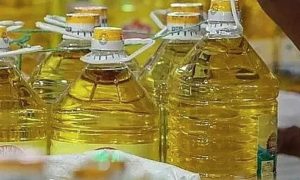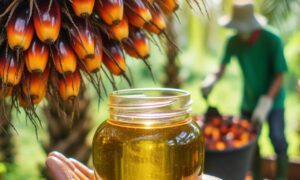Boom in vegetable oil exports from Nepal raises concerns about trade manipulation

Nepal’s exports rose 72.71% to USD 1.55 billion in 10 months, driven by re-exports of soybean, sunflower, and palm oils. These oils, imported from countries like Argentina and Ukraine, are re-exported mainly to India under SAFTA’s duty-free access, raising concerns over compliance, value addition, and impact on Indian farmers.
Nepal’s exports grew by 72.71% in the 10 months of the current fiscal year to mid-May, reaching USD 1.55 billion (NPR 217.91 billion), largely due to re-exports of soybean, sunflower and palm oils, which the country imports because its own production does not even cover domestic demand. Excluding oils, exports amounted to USD 0.91 billion, indicating their significant impact. Exports of soybean oil increased 90-fold to USD 0.56 billion (374,086 tonnes), while imports of crude soybean oil amounted to USD 0.58 billion (539,549 tonnes) from Argentina, Brazil, Ukraine and other countries.
Sunflower oil exports increased 62-fold to USD 71.19 million (457,760 tonnes), while crude sunflower oil imports were USD 0.18 billion (166,527 tonnes), mainly from Argentina and Ukraine. Palm oil exports were USD 8.26 million (6,685 tonnes), while crude palm oil imports were USD 32.75 million (32,318 tonnes) from Indonesia and Thailand. In addition to oils, Nepal exports carpets, cardamom, juices, tea and plywood. Duty-free access to India under SAFTA facilitates re-exports, but raises concerns among Indian manufacturers about trade violations.
India, which exports NPR 90 billion (USD 0.64 billion) worth of oilseeds, has increased import duties on oilseeds from outside South Asia to 45%, while Nepalese goods are duty-free. This is encouraging traders to re-route the oil through Nepal. In March, India tightened controls by replacing the certificate of origin with a proof of origin. The SEA Association of India has called for import regulations, saying it hurts local farmers and processors.
Trade expert Rabi Shankar Sainju notes that value added in re-exports often falls short of the required 30%, with traders merely repackaging imported oil. Paras Harel believes the trade is legitimate provided it complies with SAFTA rules, but calls for an investigation. While re-exports generate profits, their sustainability is questionable, as they do not contribute to real economic growth in Nepal.
To Read more about Edible Oil News continue reading Agriinsite.com
Source : Ukr Agro Consult
















